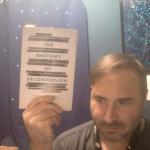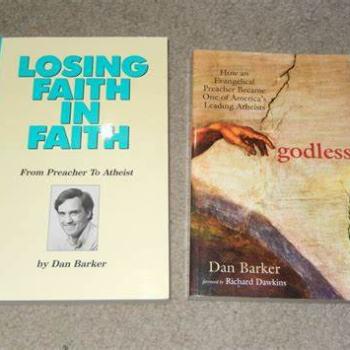The Importance of Reconversion
As under-studied as deconversion is, the matter of re-conversion is practically untouched in the literature. If studied, reconversion could tell us a great deal about both conversion and deconversion. So it is always a privilege when I, as a researcher, have the opportunity to speak to a reconvert. Such a person is author Wade Brown, whom I was able to interview upon the release of his first book.
The God Conclusion
The God Conclusion is a less-than-subtle allusion to Richard Dawkins’ famous work, The God Delusion. Like Dawkins, Brown is a man whose background is one of substantial intellectual rigor. Growing up, his father held a Ph.D., and Brown was influenced by the academic inclinations his father held. Wade himself pursued an early academic career which included economics and sociology, and his interests led him into a considerable study of science and philosophy. Unlike Dawkins, however, Wade is also a man whose background involves a rigorous spiritual journey: away from, and then back to, Christianity.
Deconversion
You see, the Ph.D. his father held was in Christian studies including the ancient scripture, the history of world religions and so on. This is because both his mother and father were devout Christians, and prayer and Bible reading were an every-day part of his childhood. Brown grew up confident of his faith, and this is the state of mind he held as he entered his academic career.
It was only after he began to study science and philosophy that Brown discovered that there were a number of convincing arguments against the existence of God or any kind of afterlife. These arguments scratched an intellectual itch that his Christian background had not. Against his father’s warnings, Brown jumped the tracks and became an atheist.
Unlike many of the more vocal atheists, Brown never considered himself angry or hostile, owing largely to a still-amicable relationship to his Christian friends and family who – he says – were all loving and patient people. In this respect, Brown was more fortunate than most deconverts, as the majority of people who deconvert report strained or severed relations with friends and family. Even so, Brown was so convinced of the non-existence of God, that he did spend a considerable amount of time trying to make other Christians “see the light” – as it were – through the intellectual arguments which had challenged him, as well as arguments he crafted himself. He recalls that he was sometimes successful in turning these Christians away from their silly beliefs.
Reconversion
The warning Wade’s father had given him, however, was this: that without God, he would be lost. Wade didn’t believe this, but over the next decade, he began to suffer tragedies for which his atheism had no answers. As his finances collapsed, his wife left him for a more successful man than himself, and he found himself without any of the material comforts to which he had held. These things, however, did not dissuade him from his disbelief.
Rather, what disturbed Wade was the idea of eternity, that after death there was nothing – non-existence. So somewhat glibly, he decided to put God to the test. He flipped a Bible to a random page, and placed his index finger wherever it might fall. The verse selected at random was this:
“The natural person does not accept the things of the Spirit of God, for they are folly to him, and he is not able to understand them because they are spiritually discerned.” (1 Corinthians 2:14, ESV)
He quickly closed the Bible and pondered. He began to pray. To “test” prayer. He began to re-read the arguments he had used to disprove Christianity, and found upon consideration that they seemed surprisingly inadequate.
Brown realized what had been lacking before. Growing up, he had only focused on Christianity as a spiritual pursuit, as a “religion thing.” As an adult, he saw the world in only materialistic terms, that there could be nothing non-physical or transcendent. But upon consideration, he realized that the transcendent and the material worked together, in harmony – and that each was incomplete without the other.
The trap Brown fell into as an early Christian, and the one he found himself in as an atheist, are the ones he sees most Christians and atheist prey to today. This, Brown feels, is why his book is so important. Says Brown:
“We must always remember that God gave us much more than just our five physical senses. Truth always converges. When it sometimes seems otherwise, we can be assured that we are not seeing something. We need to be alert to over emphasizing any one gift from God. We need to use them all in a balanced way.
“I am essentially writing to my 30-year-old self. People need to know how and why so many experts in science and academia choose not to believe in God. It’s especially important for students and other young people who respect these experts to understand what’s going on.”
Brown’s book, The God Conclusion: Why Smart People Still Believe, is now free as an e-book.
















